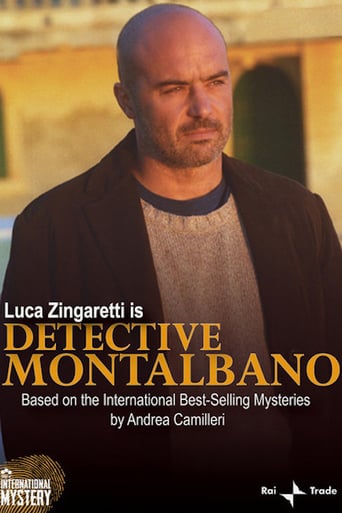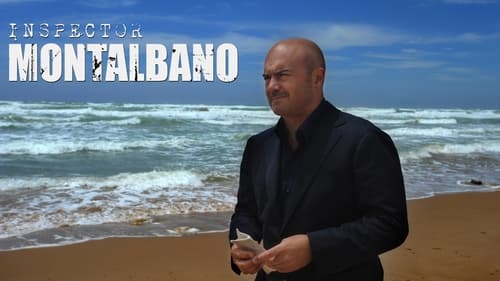frt-98135
Montalbano is great fun and a welcome change from the prevailing British detective/PI trope - a sullen, morose depressive living gloomy landscape, usually morning his lost wife, Alzheimer's ridden parent, etc. He lives in an equally depressing tiny apartment and eats TV dinners. I'm not sure why this trope is so prevalent, but I suppose they think that depressing equals deep and profound. Along comes Montalbano, who lives in sunny Sicilian in a splendid sea front apartment and dines on fine food. He is lively, excitable, and constantly gesticulating, a classic Italian stereotype. He really doesn't seem to have a care in the world apart from making sure that his next meal will be superb and avoiding another crisis with his long distance girlfriend Livia. (In the later books, he worries about getting older, but this never comes up in the TV show.)The show takes you into a world you haven't seen before. The sun, ocean and parched landscape with old, pastel, partially crumbling buildings are almost unreal. This is enhanced by the complete absence of other people or vehicles on the streets. Originally, this was the result of the producers trying to find a place that would be quieter and easier to shoot. Later, they concluded that it added a dreamlike quality to the production and did it on purpose. They were right. (It is jarring to see the prequal, Young Montalbano, where the streets show a normal amount of activity.)The plots are OK, ranging from typical serial killings to kidnapping, etc. It is all done in a gentler way than we are used to seeing. In Sicily, it seems, relationships are more important and less judgmental. It is just a slower, more languid life down there in the heat and the sun. This is reflected in the virtual absence of violence, although he and his men sometimes wield their guns and there is a small amount of gunplay in some episodes. However, the main reason for watching is the Sicilian landscape and the characters. Montalbano commands the loyalty of his equally excitable, team, most prominently Mimi, his number two and unabashed ladies' man, and Fazio, his absolutely reliable assistant. There are also lesser team members, such as Galuzzo, who is a little fast on the trigger, and Gallo, who drives like a madman, plus a few more. And, of course, there is Catarella, the comic relief who has major trouble opening and closing doors and can never get a name right. (He is even funnier in the books, where the translation does much more with his rapid speech and Sicilian dialect.) Perhaps the best secondary character, however, is the medical examiner Pasquano. I also like Balduccio Sanagra, the elderly Mafia Don. He is far more authentic and convincing than anyone you've ever seen on the Sopranos or any American show.He and Montalbano engage in a running dialog of mutual insults that is often hilarious. (Again, this portrayed much better in the books.). The show is also unusual in that it doesn't center on polished looking 20/30 somethings. Most the people you see on screen are over forty and many are elderly with all their rough edges showing. Even the minor characters have, well character. They look and talk like authentic Sicilians, probably because they are. There is some downside to the show. The continuity is very poor at times. Montalbano often suddenly shows up in a different place with no explanation for how or why he got there and what he wants to do. It is very helpful to have read the books to follow the TV show, which also often omits much of the background and rationale for his actions and conclusions. Reading the books helps, but this show really needs much better editing.Following the subtitles is difficult at times. The actors also speak very, very fast. I mean very fast. The subtitles change rapidly. Even then, they must severely truncate the dialog. You sometimes hear a word of Italian or a name in the dialogue that doesn't appear in the subtitles. I can seldom watch an entire two-hour movie in a single sitting with eye fatigue. The translation itself also often leaves a lot to be desired, as it often contains obvious, nonsensical errors.Lastly, it is hard not comparing the TV show to the books. I have already mentioned where the books are far better. As might imagined, they are better at explication and translation. Camilleri also does a lot of word play make a lot of literary references that don't appear on TV. While the books are generally better than the TV show, the TV does have some advantages over the books. The books are riddled with Camileri's leftist ideology, especially on issues of immigration and occupational safety. Fortunately, the TV show omits most of it. (The British could learn a lesson from this.) The Montalbano of the books is never described (apart from having a mustache), so seeing him gives a much stronger impression of what he is like.Overall, Montalbano is a nice change despite the shortcomings. It takes you into a world you haven't seen before with humor, a slower pace, and a set of wonderfully colorful and authentic characters. But I'd read the books first.
l_rawjalaurence
Set in Sicily, Italy, and based on a series of novels, INSPECTOR MONTALBANO has proved successful in various parts of Europe. I caught it on BBC4, the cultural channel of the BBC. It takes a lot to infuse what might be termed an over-familiar genre with touches of originality, but INSPECTOR MONTALBANO achieves this task successfully. This is chiefly due to the interplay between the three main characters (Luca Zingaretti, Angelo Russo, Cesare Bocci), who work successfully as a team yet continually bicker with one another. The shooting-style also helps; there is an extensive use of outdoor locations - as opposed to the uniformly gray interior sequences of many British detective series - and a greater reliance on pans and zooms, rather than shot/reverse shots. This gives the series an epic feel, despite the familiarity of the story lines. The scripts are tautly written with plenty of opportunities for throwaway lines from the main protagonists. Definitely worth a look as a refreshing alternative to Anglo-American detective series.
paul2001sw-1
For those of us raised on 'Inspector Morse', 'Inspector Montalbano' comes as a welcome breath of Sicilain air. Not that I didn't like 'Inspector Morse' per se; just that Morse, and his Swedish clone Wallander, fit a certain stereotype of a detective, namely the brooding, grumpy old man. Montalbano, on the other hand, is also a stereotype, but a very Italian one. He wants an easy life, good food, a relaxing environment, if he loses his temper occasionally, it's only out of frustration of things getting in his way, on the other hand, if he's faithful to his girlfriend, that's only because being involved with two women would be just too complicated. He, and the rest of the cast, play their roles as comic Sicilians to perfection: and while this might not be altogether serious drama, the combination of Mediterranian beauty, comedic moments and ropey murder plots makes for a very agreeable evening's viewing. On seeing my first episode I was underwhelmed; but once you know the characters, it's great fun.


